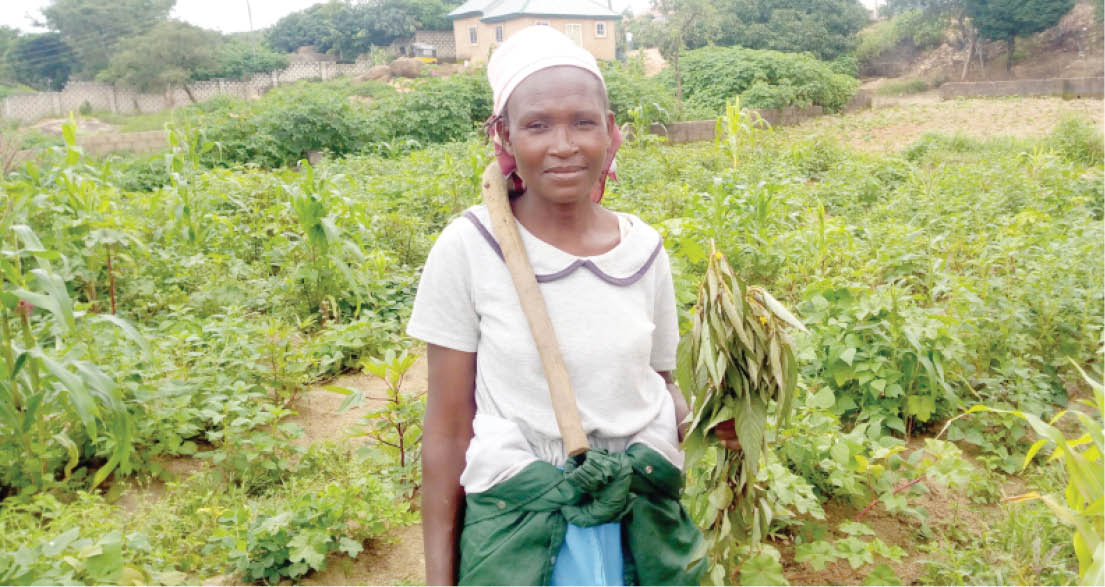Why farmers should plant jute leaves
Jute leaves popularly known as ayoyo in Hausa and ewedu in Yoruba is cultivated in Plateau State by women who have acknowledged its health benefits. Some female farmers who spoke to our correspondent said they cultivate the plant mainly for consumption of the leaves, but many people are yet to fully understand its usefulness to […]

Hannah Atsen in her farm
Jute leaves popularly known as ayoyo in Hausa and ewedu in Yoruba is cultivated in Plateau State by women who have acknowledged its health benefits.
Some female farmers who spoke to our correspondent said they cultivate the plant mainly for consumption of the leaves, but many people are yet to fully understand its usefulness to the body.
The farmers along Lamingo road in Jos said consuming the leaves has helped to prevent illness, strengthened their bodies and made them look young and radiant.
To corroborate their claim, studies have shown that the leaves have carbohydrates, dietary fibre, protein, Omega-3, zinc, potassium, copper, iron, phosphorus, beta-carotene, thiamine, niacin, riboflavin and folate vitamins A, B6, C, and K.
It is also known to slow down the ageing process in skin cells, and the vitamins in ayoyo act as antioxidants to keep the skin hydrated to reduce wrinkles.
The vitamins A, C and E in the leaves help the body to ward off cancers- ovarian, colon, breast, prostate and skin cancer – and the phosphorus and calcium in it facilitate the development of strong bones and teeth which in effect fight osteoporosis.
Other studies revealed that the intake of the leaf helps the body to combat general body pains, controls cholesterol level in the body which in effect stabilizes blood pressure at a healthy level due to the Omega-3 it contains, while the anti-inflammatory and antioxidants in the leaves boost the healing process of wounds. These are among its many benefits.
Among the female farmers who spoke to our correspondent is Hannah Atsen who said their parents and other aged people in their community who have been consuming the leaf have acknowledged its health benefits which enabled them to live long and healthy.
She said they cultivate the leaves mostly for consumption, adding that sometimes they sell it at the Thursday Market in Fobur, Jos East LGA, whenever they have it in large quantities.
She said people also follow them to their farms to buy or place orders for large quantities.
Mrs. Atsen who is in her early 40s, has six children and she uses the harvest from the cultivation of the plant and other crops to feed her family.
She said their major challenge in farming has always been fertilizer and weed control chemicals, adding that it was always challenging to farm without them.
Another farmer, Comfort Azi, 29, said the good thing about the jute leaf is that it can grow well, whether cultivated alone or with other crops.
She said planting is done from May when the rains fully set in, and when it begins to bear leaves, two to three months later, they start cutting the leaves for use from the top and other parts as the stem is left to produce new leaves until January when the dry season becomes intense.
Azi said the good thing about the leaf is that it can be cooked without much ingredients, including oil.
She further explained that to make the leaf soup more medicinal, they mix it with spices that would make it cook fast like potash and ash.
Dayyib Zachariah Adam, 60, The chairman of the farmers association in Gangare Ward of Jos, said jute leaf is very beneficial to the body and that many farmers are involved in its cultivation in the state.
He said though many people were yet to understand its medicinal benefits, it helps in the body in many ways and those using it have acknowledged that.
He called on farmers to cultivate it and also try to know its importance, stressing that those who know and are already cultivating it in large quantities are benefiting from it in many ways.
